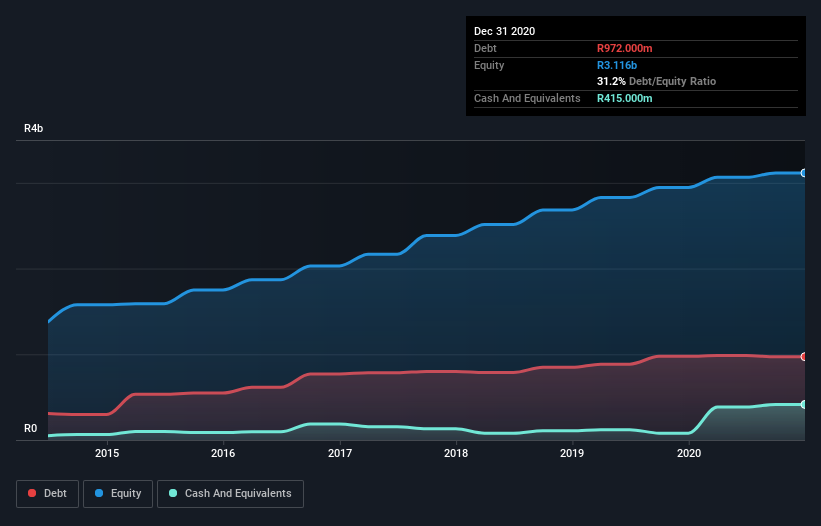- South Africa
- /
- Specialty Stores
- /
- JSE:WVR
Does HomeChoice International (JSE:HIL) Have A Healthy Balance Sheet?
Some say volatility, rather than debt, is the best way to think about risk as an investor, but Warren Buffett famously said that 'Volatility is far from synonymous with risk.' When we think about how risky a company is, we always like to look at its use of debt, since debt overload can lead to ruin. We note that HomeChoice International plc (JSE:HIL) does have debt on its balance sheet. But should shareholders be worried about its use of debt?
When Is Debt Dangerous?
Debt and other liabilities become risky for a business when it cannot easily fulfill those obligations, either with free cash flow or by raising capital at an attractive price. Ultimately, if the company can't fulfill its legal obligations to repay debt, shareholders could walk away with nothing. However, a more usual (but still expensive) situation is where a company must dilute shareholders at a cheap share price simply to get debt under control. By replacing dilution, though, debt can be an extremely good tool for businesses that need capital to invest in growth at high rates of return. When we think about a company's use of debt, we first look at cash and debt together.
See our latest analysis for HomeChoice International
How Much Debt Does HomeChoice International Carry?
As you can see below, HomeChoice International had R972.0m of debt, at December 2020, which is about the same as the year before. You can click the chart for greater detail. However, it does have R415.0m in cash offsetting this, leading to net debt of about R557.0m.

A Look At HomeChoice International's Liabilities
The latest balance sheet data shows that HomeChoice International had liabilities of R422.0m due within a year, and liabilities of R1.05b falling due after that. On the other hand, it had cash of R415.0m and R1.54b worth of receivables due within a year. So it can boast R483.0m more liquid assets than total liabilities.
This excess liquidity suggests that HomeChoice International is taking a careful approach to debt. Given it has easily adequate short term liquidity, we don't think it will have any issues with its lenders.
We measure a company's debt load relative to its earnings power by looking at its net debt divided by its earnings before interest, tax, depreciation, and amortization (EBITDA) and by calculating how easily its earnings before interest and tax (EBIT) cover its interest expense (interest cover). This way, we consider both the absolute quantum of the debt, as well as the interest rates paid on it.
HomeChoice International's net debt of 2.2 times EBITDA suggests graceful use of debt. And the fact that its trailing twelve months of EBIT was 9.4 times its interest expenses harmonizes with that theme. Shareholders should be aware that HomeChoice International's EBIT was down 65% last year. If that earnings trend continues then paying off its debt will be about as easy as herding cats on to a roller coaster. There's no doubt that we learn most about debt from the balance sheet. But it is HomeChoice International's earnings that will influence how the balance sheet holds up in the future. So when considering debt, it's definitely worth looking at the earnings trend. Click here for an interactive snapshot.
Finally, while the tax-man may adore accounting profits, lenders only accept cold hard cash. So the logical step is to look at the proportion of that EBIT that is matched by actual free cash flow. In the last three years, HomeChoice International's free cash flow amounted to 35% of its EBIT, less than we'd expect. That's not great, when it comes to paying down debt.
Our View
Based on what we've seen HomeChoice International is not finding it easy, given its EBIT growth rate, but the other factors we considered give us cause to be optimistic. In particular, we are dazzled with its interest cover. When we consider all the factors mentioned above, we do feel a bit cautious about HomeChoice International's use of debt. While debt does have its upside in higher potential returns, we think shareholders should definitely consider how debt levels might make the stock more risky. The balance sheet is clearly the area to focus on when you are analysing debt. But ultimately, every company can contain risks that exist outside of the balance sheet. To that end, you should learn about the 2 warning signs we've spotted with HomeChoice International (including 1 which shouldn't be ignored) .
At the end of the day, it's often better to focus on companies that are free from net debt. You can access our special list of such companies (all with a track record of profit growth). It's free.
If you're looking for stocks to buy, use the lowest-cost* platform that is rated #1 Overall by Barron’s, Interactive Brokers. Trade stocks, options, futures, forex, bonds and funds on 135 markets, all from a single integrated account. Promoted
Valuation is complex, but we're here to simplify it.
Discover if Weaver Fintech might be undervalued or overvalued with our detailed analysis, featuring fair value estimates, potential risks, dividends, insider trades, and its financial condition.
Access Free AnalysisThis article by Simply Wall St is general in nature. It does not constitute a recommendation to buy or sell any stock, and does not take account of your objectives, or your financial situation. We aim to bring you long-term focused analysis driven by fundamental data. Note that our analysis may not factor in the latest price-sensitive company announcements or qualitative material. Simply Wall St has no position in any stocks mentioned.
*Interactive Brokers Rated Lowest Cost Broker by StockBrokers.com Annual Online Review 2020
Have feedback on this article? Concerned about the content? Get in touch with us directly. Alternatively, email editorial-team (at) simplywallst.com.
About JSE:WVR
Weaver Fintech
Operates as a fintech company, provides financial services.
Proven track record with slight risk.
Market Insights
Community Narratives



